
Why I Procrastinate
Published 2019-07-03
This is a bit more serious than the typical tech-related articles I write. But I'm doing this for a reason. I'm writing about this because procrastination is something I've been struggling with for a very long while. However, I feel like I've finally got a lead on the why! I'm excited, and I just want to share my experiences with all of you so, if you or someone you know are like me, they can get the help they need.
An Example: How I Do Homework
Let's start at the beginning, the most obvious example. There's homework I need to do. It's pretty important, but it won't kill my grade if I don't do it. What do I do? How do I feel?
Here's about how it typically goes: I get home from class, and, because either it's on a consistent schedule or because I wrote it down in my phone's calendar, I know I have to do a homework assignment. I need to do the homework assignment. I know this. If I get the thing done I'll have the whole rest of my day to do the things I want to do.
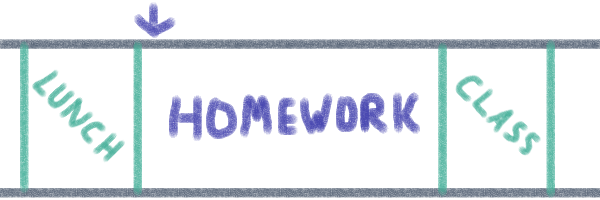
Let's say it's about lunch time, and I have a couple of hours until my next class. I'll go to my dorm to get lunch, use the restroom, grab something from my room I forgot. But it typically seems to end in disaster for some reason.

Whenever I enter my dorm room it feels like I'm sucked into the comfort of my bed. It's incredibly hard to resist, and incredibly dangerous if it's taunting reels me in. When that happens, I just get stuck there for a while, doomed to refresh Twitter or Reddit long after doing so is fun. I don't want to do this, at least not for more than 30 minutes or so. By the end (an hour or two later) I'm screaming at myself in my head to just do the thing already, jeez. It's as if there's something inside of me that just doesn't want to move.
If I'm clever about it, I'll catch myself and try to go directly to the library, leaving lunch for later. And if I I do that, I can usually get myself to at least start to work on the assignment. But even in a comfortable, distraction-free environment with everything I need in front of me, pushing forwards and doing the thing is incredibly difficult.
I'll try to read the first problem and my eyes will just sort of gloss over it and won't take it in. Coming up with a strategy to tackle it will be surprisingly difficult, no matter how obvious it seems. I'll come up with a plan, like "look up this word in the textbook", and it feels like I quickly lose that step, as if it keeps slipping out of my grasp and I have to chase after it.
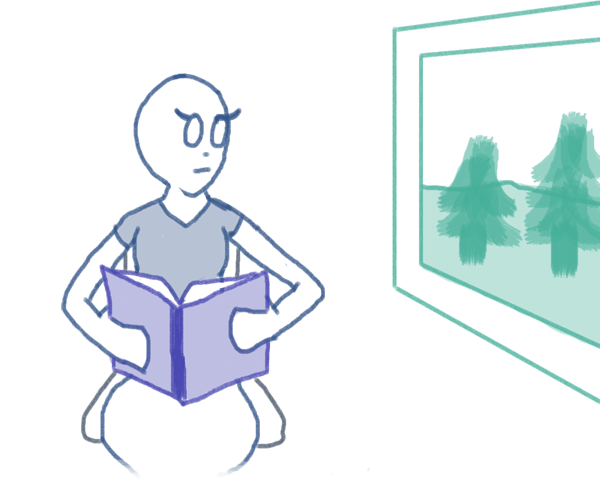
I'll find instead that I just sort of sit there. My mind flutters from the window to reading the little scribbles people left on the desk to my imagination and then back out again. Every couple of minutes I'll push forwards hard enough do one little task. Get out a pencil. Get out my notebook. Turn my notebook to the right page. Open the website with the problems.
But the moment I encounter any resistance at all, even as simple as "bah, I have to find the pencil in my backpack" or "I need to go flip through the book until I'm at the right one", I'll seize up again and lose focus. Solving the problems like this is, as you could probably guess, nigh-on impossible.
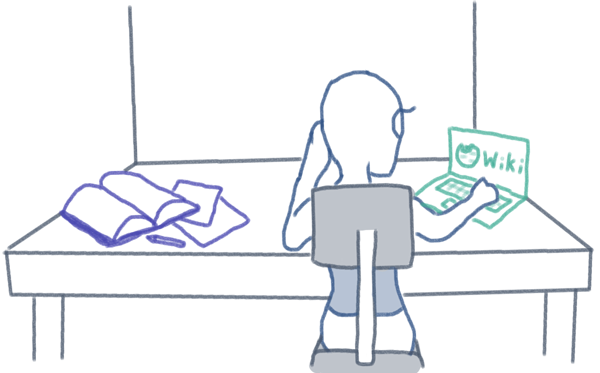
When I lose my train of thought, I'm really prone to letting my thoughts get off on the worst tangents, and it will take a while to get myself back on track. For instance, suppose a question in my homework asks me to find the efficiency of a solar panel. I'll start reading the textbook to figure out how to solve the problem. Then I come across a sentence like "Solar cell efficiency is rarely above 30% for most solar panels". Good to know as a ballpark for my results, right?
Well. This makes me start wondering what the really good solar panels are like, so I open up the Wikipedia page on solar panel efficiency. This leads me to learning that in the 70's Jimmy Carter installed some (rather inefficient) solar panels on the roof of the White House. An hour later and I haven't started the homework problem, but I could tell you a surprising amount about the 1973 oil crisis and it's effect on the American automobile industry. (It's why all the cars were really small back then!)
But wait, there's more! I'll get distracted by windows, slightly off ceiling tiles, the shelves of books next to me, fire extinguishers, cracks in the plaster, and my own thoughts. I'll even get distracted by my own body! I often find myself bouncing my legs or bouncing back and forth in my seat, stuck in a daydream, totally absorbed in the rhythm. If my mind's set on not doing the thing then it will find distractions so it can not do the thing.
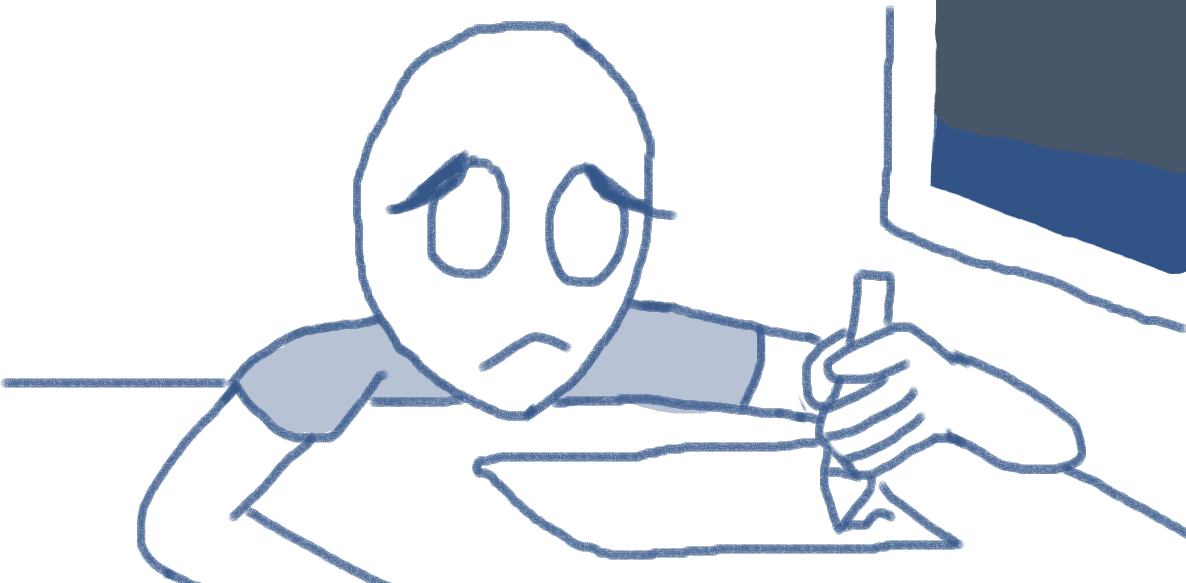
Thankfully, there does seem to be one thing that forces me to focus on something: stress. If there's a very important deadline coming up, or the consequences of me not doing something become bad enough, I'll do the thing. It will be garbage, it'll be the bare minimum. but typically it will get done. If I have enough time, it can be decent, but the stress often doesn't become overwhelming until I'm right at the edge of the deadline.
But it's not always like this?!
As you could probably guess, all of this is rather disastrous for getting anything done. ...but I have gotten stuff done. I'm decently far in college. I have this whole website. I didn't make it this far out of sheer luck.
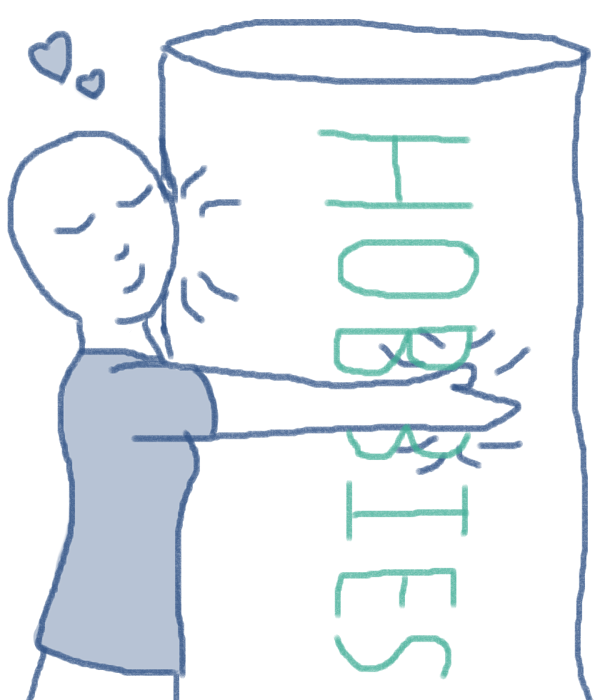
The truth is I only seem to be an unfocused mess around things that don't catch my interest. Otherwise? I'll grab on and never let go.
Whatever I'm stuck on will be all I can think about. When I'm trying to do other things my mind will just jump back to that, distracting me from what I'm trying to do.
The most common examples for me are endless Wikipedia browsing with no point, or jumping between Twitter and Reddit forever. This typically ends either when I can force myself back on what I'm supposed to be doing, or my own bodily needs outweigh whatever I'm stuck on.
I tend to stick with something a little longer when it happens to be something I'm both interested in and want to be interested in. Let's take my endless fascination with video game modification. It's a super engaging and fun problem to try and hack a game. When I'm stuck on it, I need to figure out how the game ticks because it's just what my brain craves. It almost feels like feeding an addiction, except it's at least productive in some sense.
When I'm stuck in this state where a project is all I can think about, I give it my all. Surprisingly enough, the results tend to be pretty good. Months later I can look at all of that stuff and not even really comprehend how I did that.
As an aside, something I find interesting is that when I'm stuck on something like this, distractions like bouncing my leg or listening to music don't make me lose my focus at all. If anything, they help me focus better. It's the strangest thing, it's like I need the stimulation or something.
Why I Needed Help
The thing that motivated me to seek help about this was the realization that this was effecting a LOT of my life. This is more than just homework or getting stuck on fun hobbies. My procrastination or whatever was starting to wear on me, hard.
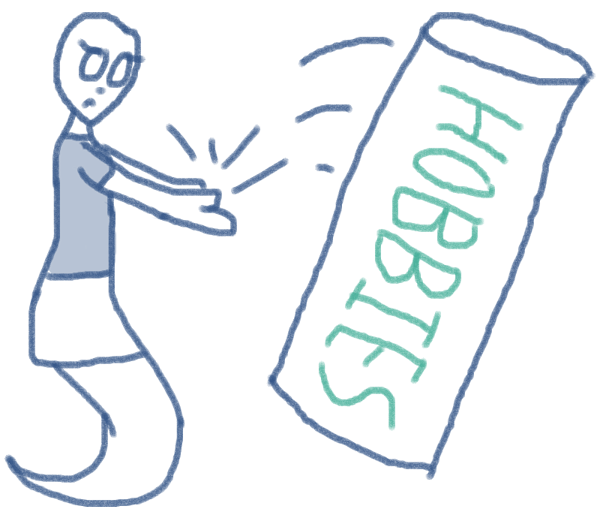
A large problem is that I can't choose when I'm interested in something. For instance, a big thing I'm known for is modding Sonic R. I've been largely burnt out it for months, though. In fact, Sonic Redux, my big Sonic R mod from 2017, was mostly done in intense little spurts with absolutely nothing for months in between besides feeling like garbage for not having the motivation to work on it.
Worryingly, the Game Boy game I'm currently working on is turning out the same way. I had a major push last summer where I did nothing but chip away at it, and then just sort of fizzled out as I lost interest. Every time I've tried to work on it recently, I'm just the same unfocused procrastinating mess I am towards other stuff. I don't understand why. I enjoy working on it, even if I'm in a bit of a rut right now. I want to see it finished. I just can't.
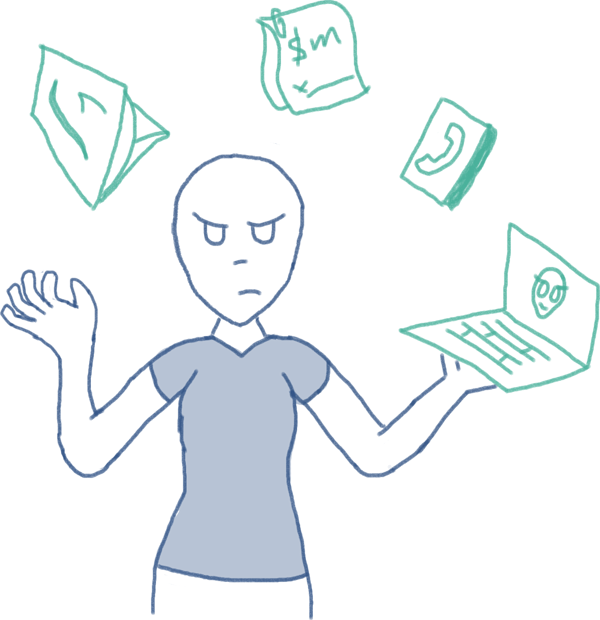
Now. Take that mindset and add responsibilities to it. Taxes, emails, homework and tests and obligations and promises. I can (and have, multiple times, sometimes even skipping class to make time) set aside an entire day to do one important task. And unless I'm in the right headspace, it's like pulling teeth to get it done. I struggle to do my laundry on a regular basis. I have 3 unread emails relating to some code I wrote that have been sitting there since January, probably telling me problems I've been aware of since January of last year. (I eventually checked them sometime during the writing of this article.) In high school I could barely get myself to apply to jobs or colleges or scholarships. My grades are not as good as I think they could be if I could just not procrastinate.
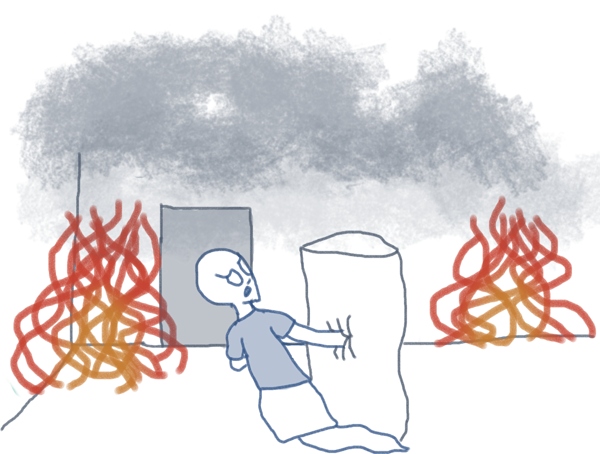
But what about the moments where I can't help but focus on something? Turns out it isn't healthy. I must stress: my brain latches onto these things at the exclusion of everything else.
I recall, during the crunch time of Redux's development, I just didn't eat lunch or even dinner some days. It wasn't a conscious choice or anything. It literally did not occur to me that I needed to eat food until I became so unbearably hungry that I had to make something.
I could literally have tornado sirens and EAS alerts going off around me and I still wouldn't budge. That's not even an exaggeration, that literally happened once. I didn't notice I was in danger because I was so engrossed in what I was doing. Someone had to get my attention and snap me out of it before I realized what was going on.
What's fascinating is that this isn't an every day thing. Most days it's like this it feels, but on some days I can just sit down and do the homework. And it's pretty easy. And I wonder what the heck I was making a big fuss about because come on Viz, that only took you 30 minutes. And then the very next day I'll work on a different assignment for the same class and it feels impossible again.
So What's Up?
As of late, I've found that stress no longer motivates me like it does. I've used stress as my crutch before, and it's not working anymore. Thankfully I can still motivate myself well enough for the really important stuff like taxes or course registrations, but I'm slipping. Hard. I've actually failed my first class this semester, simply because I was behind and I could not catch up. (Spending time writing this instead of studying probably didn't help much. :P)
I talked this over with my therapist. We came to the mutual conclusion that I have Attention Deficit Hyperactivity Disorder, or ADHD. What is ADHD?
Attention Deficit - I have trouble regulating my attention, either not being able to focus on something or not being able to stop focusing on something.
Hyperactivity - A low-key constant need for motion or stimulation of some sort, like the leg bouncing I was mentioning earlier.
Disorder - This is negatively effecting my life in multiple areas.
...yep. That sounds about right. But that's not what I thought ADHD was?
Debunking old stereotypes
The myth
Popular media always paints ADHD as a label you put on rowdy young school boys who just need to sit down and shut up, and where "Big Pharma" pumps out sedation drugs and ruins our children's future. One particularly bleak image is this fake Calvin and Hobbes strip where Calvin loses his imagination and is turned into a zombie because of the evil pressures of Big Pharma, the American education system, and so on and so forth.
I need to stress, these stereotypes come from misinformation. I looked at some old newspaper and magazine articles to get to the bottom of this. (See links at bottom of page.) From what I could gather, parents' concerns started innocent, and then were severely blown out of proportion. The effects of past fears linger on to this day.
Parents of the time were concerned that stimulant medication was being used as a "replacement for education". The only reason it was needed, they claimed, was due to the rising pressures of modern society, and that they were in the long term harmful. There were reports that schools forced kids on medication against their will, that psychologists suggested putting Ritalin in the water supply, and that children on stimulant medication did things such as bang their head against windows in agony, becoming hostile and suicidal.
That said, I strongly believe that a lot of the more distressing examples from these articles were exaggerated or flat-out fabricated. Looking at everything, most talk against stimulation medications comes from the "Citizen's Commission on Human Rights International". Looking them up, I was surprised to learn that it was a sock-puppet organization created by the Church of Scientology with the express purpose to discredit psychology as a whole. Through their efforts, along with other well-meaning but horribly misinformed groups, the very idea of ADHD and especially ADHD medications has been demonized.
That's not to say that there aren't legitimate concerns regarding the potential for overdiagnosis, the interests of the American pharmaceutical industry, the side effects of stimulant medication, and the pressure on children and college students to be good at schoolwork. Those are all very serious problems that society needs to address. However, if you were to go solely by popular culture you'd get the impression that ADHD is a fictitious disorder, and it's not!
The reality
In reality, ADHD is more than just not paying attention in school, and the diagnosis requires that it severely and negatively effects many portions of one's life. ADHD effect's people's jobs, their home life, their ability to acheive their dreams and ambitions.
If you look at the current DSM criteria for diagnosing ADHD, you can see just how much it effects one's life, and how strict the requirements for diagnosis are. In addition, modern psychologists overwhelmingly agree that stimulant medication, when responsibly prescribed, are immensely helpful in combating the symptoms of ADHD.
Additionally, there's been an increase lately adult ADHD diagnoses, especially in women. ADHD was once thought to go away once childhood ends, but researches are increasingly finding that this is only true some of the time. Many adults struggle with the symptoms of ADHD and don't realize it because of the stigma surrounding it. Women especially are a concern because they don't usually exhibit hyperactive traits, which combined with the old stereotype of "rowdy young boy" leads to a lot of missed cases.
ADHD is real, some people have it, and I'm one of them. I'm not rowdy, I'm not a boy, and I'm not in elementary school, and yet I still have ADHD.
Symptoms I Have
Now that we have a better lens to view all of this from, let me go back and put some more accurate names on things, and maybe find some new things I didn't know I was struggling with.
Executive Dysfunction

My inability to sit down and focus on something is referred to as Executive Dysfunction. It leads to issues in time management, planning, and short-term memory. Here's a fairly readable overview of it.
Fitting that into my life, it mostly seems to hold true.
- I am awful at time management, hence the whole procrastination thing.
- I think my short term memory is okay, but I know that if someone tells me a list of things I need to do or a locations I need to go to, I will have a hard time remembering them unless I write them down.
- I'm pretty good at planning stuff out, so long as I have a concrete goal I need to accomplish. It tends to break down hard with more abstract goals, though, like "study for this test".
Hyperfocus

That state where I get too stuck on things thing is called hyperfixation or hyperfocus. Briefly, it's when you can't regulate your attention away from something, even if you really need to, and even if it's not enjoyable. Even if there's something more urgent or useful I could be doing, if I'm hyperfocused on something it will be hard to break out of that and even harder to do what I'm supposed to, because I'm so mentally fixated on the meaningless nonsense I got sucked into.
Keep in mind that this is related to but distinct from being in "flow", or "in the zone". Flow refers to the state of mind when you're willingly engrossed in something, as if the rest of the world is just tuned out, and you find yourself deeply enjoying what you're doing, but you can stop. Here's some more reading on the two, if you're interested.
It's possible (and somewhat frequent) that I hyperfixate on something that's important, and instead of trying to break free I just let it happen and enter a state of flow. Or I can go from not being able to focus on anything to gradually warming up to something to being in flow. It's a very complicated relationship between the two states.
Hyperactivity
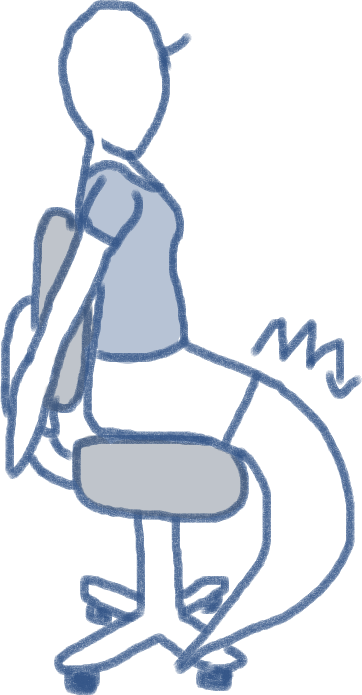
First off, it's worth nothing that in 1994, ADHD (Attention Deficit Hyperactivity Disorder) and ADD (Attention Deficit Disorder) were merged into just ADHD, but with two subtypes: inattentive and hyperactive-impulsive. Someone could have one or both. (Or none, of course. Lucky ducks.)
I'm more on the inattentive side. I don't spend a lot of money on things I don't need, I don't blurt out words or leave my seat during class, etc. like some people that lean more hyperactive-impulsive may do. But I still have some hyperactive traits. A big one is that every rare once in a while I'm just indescribably in the mood to be active, like a little pent up ball of energy. So I'll get on my bike and get lost in the city and bike for about 6 miles or so until I've worn myself out. I don't ever give myself a set path when I'm doing that, I just go wherever feels good.
Another classic one I've already mentioned is fidgeting. If I'm stuck in a chair, I almost always need to keep something moving, whether that be bouncing my leg up and down because that feels good, or pushing the end of my pen against my desk repeatedly so that it almost-but-not-quite clicks. At it's rare worst, I become so antsy that it feels like staying in my seat is a real struggle.
Head Noise
This really isn't a term I've heard anywhere else, but it echoes the sentiments I've heard from other people on the Internet with ADHD, so I'll stick with it. You know how you listen to a catchy song, and then it gets stuck in your head? Imagine that except forever. While your mind is running around it's hyperfixation. And sometimes there's a second song, somehow.
I find it extraordinarily difficult to just... relax. Sit on a bench and watch the clouds. I can do it, sometimes. I love the physical feeling of spring breezes and warm jackets and grass and dirt and trees. Likewise, I love the mental feeling of having nothing I need to do.
But even if I'm in that perfect scenario where there's nothing to do... my brain will just fill the void with absurd daydreams and rabbithole trains of thought. Living in the moment and just smelling the roses is can be difficult at times because my mind can't just hold onto that feeling of nothing. My brain has to constantly be stimulated by something.
Rejection Sensitive Dysphoria
There is a decent bit of controversy behind this term, mostly because it's a new term not (currently) recognized by any scientific organization. That said, it does seem to resonate with a lot of people with ADHD, myself included, so I'll use it anyways with that disclaimer in mind.
The best way I can describe it is... with the name. I am sensitive to rejection, because it causes dysphoria (bad feelings).
Let me explain a little more concretely. Say I take a test or do a homework assignment, and I get a grade. I don't look at the grade. Almost ever. Even if it's a good grade. I really should, in some cases it would help me out a lot. But something about the idea that what I did wasn't enough just stings at a really deep level.
This is even worse when it comes to things I some amount of heart and soul into. Bringing Redux back out as an example, I just felt something between anxiety and just a deep sinking feeling in the gut at all the comments saying that I needed to work on the art more. Which, yeah, in hindsight, the art was pretty bad. I don't want to make anyone who said anything like that feel bad; it was something I needed to hear. But in that moment those comments stung.
This is more than just "I don't take criticism well". It's deeper than that. More emotional than that. It's dreading being called into the boss's office at work because you're mortified of the worst. It's bursting into tears at the possibility of failing a class, or getting detention. It's letting people walk over you because you don't want to upset anyone. It's bad.
Some Perspective
Despite all of that, I am thankful that I don't have nearly as bad of ADHD symptoms as I could. There are other people who suffer far, far worse than I do. I'm in a pretty good university, I have a career path ahead of me, and until very recently I've been doing well enough in all of my classes. Other people don't have those luxuries.
For example, GravisLizard made this rather long but really nice writeup on his experience with ADHD. In it he describes having severe memory issues and incredible difficulty planning tasks, which I don't have. In his example with the phone setup, I'm fairly confident I could just stick with a task and do that until it's done, even if it takes me a little while to decide which one to start with. He can't. And more generally, when I'm at work I can almost always can get my tasks for the day done, while he struggles a lot more with that.
But the question isn't who has it worse. It's who has it bad. People without ADHD do not have issues sustaining attention or avoiding difficult tasks or getting distracted or zoning out or missing deadlines like I do. Yes, most people do all of those things to some degree. But I believe the severity and consequences of my issues are beyond what I should have to deal with without help.
I largely wrote this article not to complain about how my own brain is a steaming pile of garbage, but to get you to consider thinking about issues you may have through a lens you may not have considered yet. If anything I've written here resonates with you, please look into this some more. Even if you don't feel that you are strongly affected by ADHD, or that what you're dealing with isn't a big deal, if you think having someone help you with your problems would be good, there is no shame in asking a professional. Your problems matter. You matter.
Tips and Tricks
That said, I realize that not everyone is in the position to seek a professional for help, or to get effective treatment in a timely manner. In the meantime, I'll at least share some tips and tricks for trying to focus on things that I've found at least somewhat helpful.
Start stuff ahead of time

I realize that this is really hard to do, but please try and give yourself a few day's buffer room to complete a task. If on the first day you find that you absolutely cannot do it, get as much done as you can and postpone the rest until the next day. However, if you can get it done, then it's done ahead of time.
Use the extra time to break up your tasks into smaller chunks. Don't think of it as "the whole task needs to be finished by Friday". Think of it like "The first part is due on Monday, the second on Tuesday, etc."
Use calendars and notes
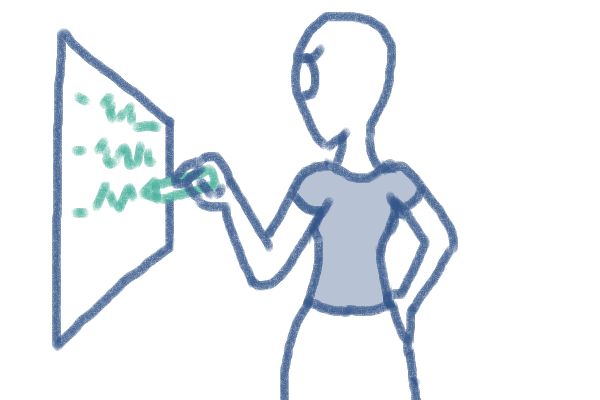
- If you are told that you need to complete a certain task on a certain date, write it down.
- If you need to do chores on a regular basis, write them down in your calendar.
- If you come up with a question that you're curious about but don't have the time to answer (like my solar panel example), write it down and come back later.
- If you want to get homework done early, schedule some time to work on it.
- In short, if you're not going to take action on something right away, write it down.
One useful tool for this is the bullet journal. I'm not referring to the super intricate art projects you'll find on Pinterest and the like, but the original notes-in-a-notebook bullet journal. There's a quick primer on it here, but the jist of it is that you write down the things you want to remember, and then you look back on them later. /r/bujo is a nice discussion board for these practical types of bullet journals.
Use distractions wisely
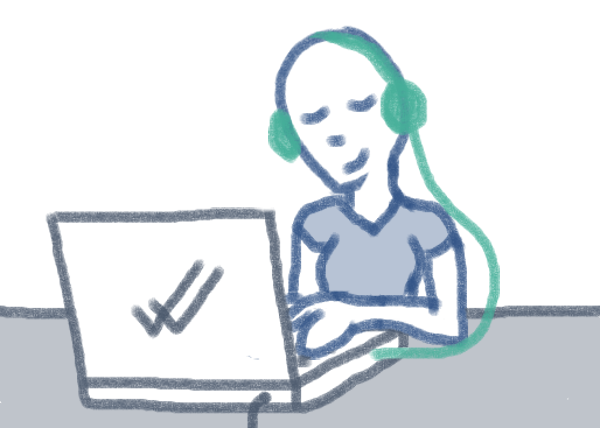
Remember earlier how I remarked how odd it was that I craved stimulation during hyperfocus? That's true! People with ADHD inherently need more stimulation than people without, even when something has their attention. (In fact the primary medications used to treat people with ADHD are stimulants for this exact reason!)
If you choose your distractions wisely, they can leave you stimulated enough without being taking away your focus. I pretty much cannot work without some sort of music to keep me engaged. Sometimes I find that podcasts or creative livestreams are helpful, something that I don't have to pay super close attention to but can still tune in and out of, like the Far Lands or Bust series where Kurt just talks about whatever's on his mind, or TED talks, or if you're a nerd like me PyCon and CppCon talks. A friend of mine made a big list of podcasts here to choose from too. (Be careful that you don't choose something too engaging, though.)
If you find you're physically restless, consider some fidget toys. Yes, fidget spinners were the great meme of 2017 and the idea of fidget toys has a bit of a stigma around them as a result. However, they and other fidgeting devices are designed keep yourself physically engaged while your mind churns away. I won't pretend to be an expert in these, as the closest thing I've got is a really squishy cube I keep on my desk. But I do find the contained distraction useful, especially when I'm reading something.
Don't go alone

If you find that you are absolutely struggling with something, whether that be getting motivated to work on something or planning out how to work through a problem, there's no shame in asking a friend to keep you on track. I find that I work a lot better in a team than I do alone.
If you're able, if you can get someone who can mentor you or assist you, that's good too. This is especially true for college students, because your college has resources that you're supposed to use. I've also found that having someone to bounce ideas off of helps me understand the material better than I ever could alone.
Don't overwork yourself
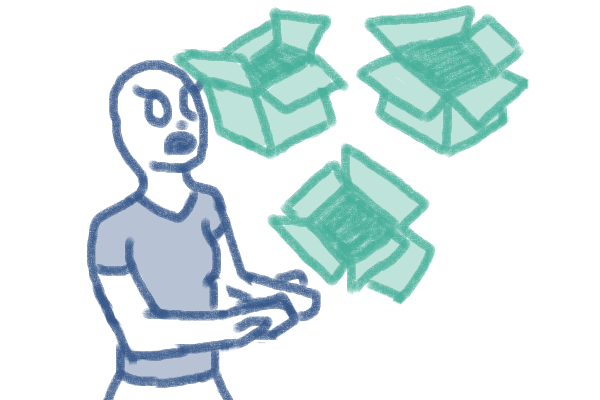
Last semester I had 3 classes, a research project, and a job. This was too much, in retrospect. I could not handle that. I should have instead cut back on the responsibilities I had to handle, so I would have had more mental energy to throw at the things that matter, like homework or studying.
It does slightly sting that I can't do as much in a week as some other people, but I figure that doing some things decently is better than doing many things poorly. If you find yourself struggling at a job, maybe consider cutting back on hours if it's economically feasible, at least for a week or two to try.
On that note, don't overpromise either. I'm pretty bad at this, but I am learning that if I can barely handle my own responsibilities, I should not feel obligated to promise anything else on top of that. Fight the urge to say "Yeah, I can do that" unless you plan on doing that very soon. Otherwise you might lose interest in it, and then it'll be another chore you have to force yourself to do.
Know when to fold
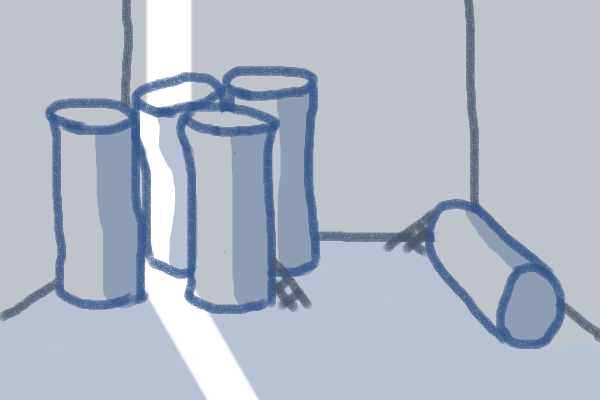
I'm mostly stealing this from this /r/ADHD post. Basically, the fact of the matter is that your hyperfixations will end eventually. Don't beat yourself up when it does. Choose hobbies that you can start and stop with little pressure or financial loss, like writing, drawing, playing an instrument, or computer programming. Your wallet will thank you.
Closing thoughts
I wrote this article starting from the procrastination angle because I was specifically trying to play up what Tim Urban's "Why Procrastinators Procrastinate" made me think about myself when I first read it in early high school. I resonated with a lot of the things that he described, and the analogy of the monkey and the panic monster and the dark playground and all made a lot of sense.
The problem with that is that I don't think that Tim realized that he was describing executive dysfunction, like I now strongly believe he was. He had me thinking that I was just "a procrastinator", and that my problems were problems everyone had. Turns out, they aren't.
The advice he gives in his second part is inadequate, boiling down to "break it down into chunks, set up Panic Monsters, and just do it". Unfortunately, this mindset has caused me to rely on dangerous and stressful methods of getting stuff done. If I had instead sought out proper help, I would have had much better coping mechanisms for dealing with the problems ADHD gives.
If you are "a procrastinator", it may be for reasons outside of your control, and that's okay. If you need medication or therapy to be able to do the things you want to do, that's okay. It's nothing to be ashamed of. I again stress, if you feel that either you or someone you know relates to this article, please seek some help from a medical professional. They can help you.
I also made an attempt to make this article as accessible as possible for people with short attention spans or difficulty reading long articles. It's split into many sections, the paragraphs are short, the most important parts are in bold, and I drew plenty of illustrations. It should also be accessible to screen readers and Firefox's Reader Mode. I hope this effort has been helpful.
Thank you so much for reading this. I sincerely hope this helps someone out there become the best them that they can be.
Other Reading
Some of these were linked in the article, but if you're interested in reading more here's some good resources.
Other's Experiences
- ADHD: A Lifelong Struggle - GravisLizard's experiences with ADHD (38-48 minute read)
- /r/adhd - Reddit community for ADHD
- Quora - What is it like to have ADD or ADHD?
- What's the Real Lesson?
- Tumblr post that takes a look into the long-term effects of relying on stress to complete tasks
Explanations of Symptoms
- ADHD Explained Using Comics - Infographics by Dani Donavan that give broad overviews of symptoms
- ADHD Alien - Cute comics diving into the details of individual ADHD symptoms
- Understood - ADD/ADHD - Tom Brown explains ADHD in a very thorough and nuanced way. (28 minutes video)
- Adult ADHD Self-Report Scale Symptom Checklist
- LD Topics - What is Executive Functioning? (10-12 minute read)
- Why Procrastinators Procrastinate
- A good methaphor to think about executive dysfunction
- Hyperfocus vs. Flow
Coping Mechanisms
Unfortunately this list is rather empty, because I'm still working on this myself.
- Spriteclad's podcast list
- Advice on picking hobbies
- How to make a bullet journal
- Reddit community for practical bullet journals
Newspaper and Magazine Articles
Please note that some of the historical articles (pre-2000) may have incorrect information. Read with care. I've also included a couple of modern articles that I liked. Everything here is sorted by chronological order.
- "Sales of Drug are Soaring For Treatment of Hyperactivity", New York Times, May 5, 1987
- "Ritalin: Are schools playing Russian roulette with kids?", Los Angeles Times (via The Recorder), January 4, 1988
- "Spark behind the Ritalin firestorm", Associated Press (via The Auburn Citizen), April 4, 1988
- "The Ritalin Controversy", D Magazine, October 1988
- "Suits, Protests Fuel a Campaign Against Psychiatry", Los Angeles Times, June 29, 1990
- "Kids Who Can't Sit Still", New York Times, August 4, 1991
- "Childhood ADHD often can linger into adulthood", USA Today, March 4, 2013
- "ADHD is Different for Women", The Atlantic, April 3, 2013
- "Your brain on ADHD", New York Times, June 1, 2015 (infographic)
- "Why cases of ADHD in young women are skyrocketing", USA Today, January 18, 2018
- "I Need Medication to Treat My Mental Illness. Why Can't People Accept That?", Vice, May 10 2018